MARKET OVERVIEW
The Global Artificial Intelligence in Animal Health market is revolutionizing veterinary care and animal husbandry. Rapidly evolving AI is now a key player in animal health services with the aim of creating innovative ways for disease detection, diagnosis, treatment planning, and animal welfare. This sector consists of AI-oriented tools and software with the objective of elevating the efficiency, accuracy, and quality of animal care from companion animals to livestock and wildlife.
Consequently, AI considers more calculated, accurate, and data-informed methods that are developing for animal medicine and agriculture. AI technology, leveraging advanced algorithms and machine learning models and predictive analytics, aims to analyze heavy data sets to provide insight that would have otherwise been impossible to appreciate through old methods due. AI entails that veterinarians and animal health professionals can now quickly and confidently make decisions, reducing the time spend on diagnostic decision while improving treatment outcomes.
The Global Artificial Intelligence (AI) In Animal Health would broaden the numerous applications in diagnostic imaging, monitoring systems, disease prediction, and drug discovery. These AI-based imaging techniques will provide high precision in interpreting X-rays, MRIs, and ultrasounds for the early identification of abnormal conditions in animals. Predictive analytics should be able to assess the likelihood for a potential outbreak of any disease from data across a wide array of parameters, including environmental factors, genetics, and previous health records. Such proactive measures will greatly reduce the chance to further the spread of diseases and allow timely interventions.
In animal health, the AI-led solutions will look to change livestock management practices with precision feeding, monitoring of animal behavior, and assessing the health of herds in generic terms. Real-time collection and analysis of data will help in the identification of patterns that are relevant to stress, disease, or other forms of welfare concerns, allowing farmers and caretakers to act in the interim. This will also facilitate more efficient breeding programs through genetic analysis and prediction of desired traits, leading to healthy and productive animal populations.
In the pharmaceutical domain, the Global Artificial Intelligence (AI) In Animal Health market provides a stimulus for drug discovery and development. AI models will predict the interaction of various compounds with animal biology, thereby reducing the time and cost of bringing new medicines to the market. This technology will also aid the personalization of treatment regimens by studying individual animal health data, ensuring that therapies are geared to specific needs.
AI applications in animal health will become even more advanced and diversified as the market matures, creating partnerships between technology developers, veterinary practitioners, and agricultural stakeholders. With greater implementation and acceptance of AI tools, operations will be streamlined, accuracy of diagnostic procedures will be enhanced, and animals' living conditions will be improved.
In the years to come, the Global Artificial Intelligence (AI) In Animal Health market will continue to enjoy growth as technological innovations increase the demand for smarter and efficient animal health solutions. Such growth will indicate that AI is increasingly acknowledged to provide solutions to extremely intricate hurdles in veterinary care and livestock management, which in turn define a fresh paradigm for global animal health and welfare.
Global Artificial Intelligence (AI) In Animal Health market is estimated to reach $4,767.72 Million by 2032; growing at a CAGR of 19.3% from 2025 to 2032.
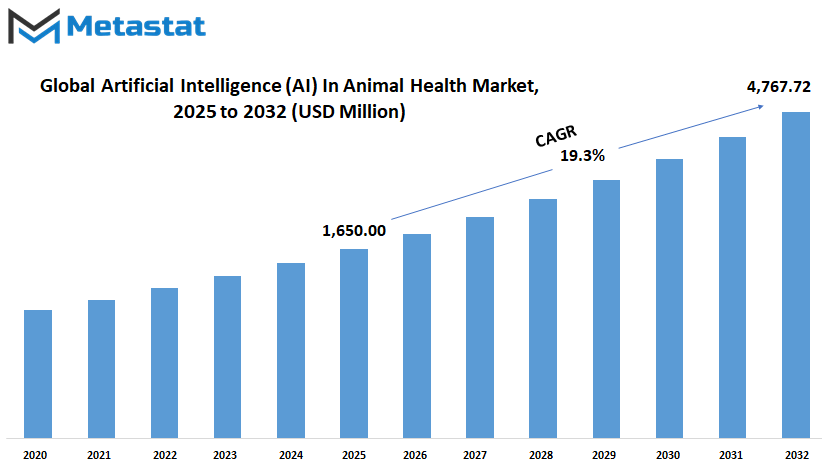
GROWTH FACTORS
The Global Artificial Intelligence (AI) in Animal Health market is expected to experience an unprecedented boom in the coming years, owing to an ever-increasing demand for more efficient and advanced veterinary care. AI is becoming a major player in the technological transformation of animal health monitoring, diagnosis, and treatment, powered by the relentless wave of increasing requirements for precision livestock farming with real-time monitoring and early detection of diseases. Almost instantaneously, AI systems allow farmers and veterinarians to assess animal health and behavior with a high degree of accuracy and therefore intervene as soon as the first signs of disease or discomfort appear. This indeed increases animal welfare, productivity, and economic losses reduced in the livestock sector domain.
Moreover, among other possibilities, AI could be greatly regarded in diagnostics. Enter machine learning and predictive analytics, which allow veterinary practitioners to assess animal health conditions in a simpler and more timely manner. AI-based diagnostic tools facilitate early disease detection, thus optimizing the efficiency of treatment and benefiting the outcomes. It can also run through extremely high volumes of data to derive insights aiding in tailoring treatment regimes to the individual needs of particular animals. Thus, with accurate diagnosis, there will be fewer instances of wrong diagnosis or inappropriate treatment, therefore contributing a great deal to the overall quality of veterinary care.
Yet, there are few obstacles in animal health common to AI acceptance. The high cost of AI technology is among them. Given huge investments required in recombinant AI technology, infrastructure, and software, AI solutions looking this way are not within most potential buyers' range. The financial barrier would be even crueller for small veterinary practices as well as small farms, hence further barricading their ability to use such revolutionary tools. Plus, there is not enough manpower with the needed skill sets to develop, maintain, and manage AI-based systems. Until there is sufficiently trained personnel and a knowledgeable workforce, AI will never be fully realized in animal health, and that adds to the obstacles for its acceptance.
However, there are glimmers of hope concerning potential bright futures for this market as possible neglected opportunities gap, like the emergence of more telemedicine infrastructures for veterinary care. AI-based telemedicine technology especially pertains to teleconsultation of animal patients that allow easier access to veterinary services, especially in remote or poorly served areas. In this case, the vets do not require the client to come to them physically; instead, communication is through virtual consultation, supported by AI-based diagnostic aid, for guidance and recommendation treatment on cases. Ruined time and costs on medical treatment that prompt needed administration when required to vet-animal patients.
As technological innovations continue to mark their presence within the walls of the veterinary profession, a burgeoning Global Artificial Intelligence (AI) in Animal Health would definitely represent the positive fortunes destined to be accrued in the future. The common advancings in the AI knowledge and the growing awareness of its positive effects will help ensure that hurdles-in-the-loss part of the evolving market will be surmounted soon and new doors opened to improvement of animal health countrywide.
MARKET SEGMENTATION
By Solutions
The future prospects of the Global Artificial Intelligence (AI) in Animal Health market seem bright as far as growth is concerned. AI, as it advances, will transform the traditional ways of approaching animal welfare within its integration into veterinary care and animal health. This will probably bring a disruptive future in animal healthcare with efficiency, accurate results, and innovations to the industry as well. As a data analysis tool, AI helps provide reasons for some insights, which were eluding previously.
One of the major forms in which the Global Artificial Intelligence (AI) in Animal Health market is growing is in the demand for more efficient approaches for managing the animal. This makes keeping healthy more urgent as increasing population and demand for livestock and pets should be cared for more than ever. Such an application paves the path for improved disease detection, behavior monitoring, and improvement of treatment methods for animals. This would ensure their health and at the same time contribute to public health through disease prevention.
The AI in animal health market is segmented into multiple solutions like software, hardware, and services. In particular, software acts as an enabler for data analytics, diagnostic support, and predictive modeling. Such software uses advanced algorithms to capture patterns and identify early health problems for faster and more effective treatments. This would significantly reduce the time required for diagnosis and minimize disease spread risks among animal populations.
Another great element of the developing market is hardware. Devices with AI capability, smart sensors, or monitoring systems allow real-time tracking of an animal's health. Such tools can be used to measure vital signs, track habits, and detect deviations that may indicate illness. This technology enables farmers, pet owners, and veterinarians to respond very quickly to signs of distress, which allows for treatment to be initiated at very early stages.
The Services segment is a key market sector that concentrates on providing specialized help in implementing and managing AI solutions. Consulting, training, and technical support ensure that any implementers of AI tools do such practice concerning what constitutes a good program with an integration plan to incorporate the new technology into pre-existing animal health practices. Such bridging would allow having maximum benefits from AI by closing the gap between the technology and practicality involved.
The future looks literally bright for Global Artificial Intelligence (AI) in Animal Health. Innovations will likely continue rolling, and AI will be entrenched as part of animal health care into expectation. There will also clearly be improvements in diagnostic accuracy, better monitoring systems, and efficient services to support the animals, which all will conclusively change the manner in which we treat animals, promote their health, and overall wellbeing globally.
By Animal Type
The market for Artificial Intelligence (AI) in Animal Health-Global is ready to change the way animal care and management will be approached in the future. Since technology will continue to grow and improve, AI will likely play a major role in keeping these animals alive and cared for. This market has started gaining traction due to its promise to enhance disease detection, treatment, and prevention. With the aid of AI, animal health professionals will be able to arrive at faster and more precise decisions that would culminate in a greater benefit for the animals and their owners.
AI will certainly have an impact on the welfare of companion animals such as dogs and cats. These pets have become a family member, and their health remains important to so many. AI-based devices will provide monitors for their well-being, through wearables measuring vital signs, behavior, and activity levels. These sets of information could be evaluated for early signs of sickness so the veterinarian could intervene before serious conditions arise. In addition, AI would analyze syndromes and compare them with large medical databases to assist in determining diseases more accurately.
This technology will also be of benefit to food animals such as cattle, poultry, and pigs. Farmers will probably rely on AI systems to monitor health care in livestock, ensuring that any situations such as infections or nutritional deficiencies are identified early. Through automated monitoring, AI would give instant insights into animal behavior, feed consumption, and general conditions. Not only will these promote animal welfare, but they will boost productivity by preventing outbreaks of disease and maintaining optimal living conditions. Measures for selecting the healthiest and most productive animals through genetic analyses leading to more efficient breeding programs shall be supported by AI.
In aquaculture-for fish and shrimp-therefore, AI will find its own application here. Monitoring the health of aquatic animals can be a little difficult at times due to their environment; however, with AI technology, this is going to change. AI systems will track water quality with the help of sensors and imaging tools, look for signs of diseases, and monitor growth rates. This will help in preventing large-scale losses and in ensuring sustainable practices in fish and shrimp farming. Data analysis will also further AI in developing better feeding strategies and managing breeding cycles better.
With changes in AI technology, the Global Artificial Intelligence (AI) in Animal Health market will witness the importance of its application in animal care across different sectors. Monitoring, diagnosing, and treating with precision and efficiency will pave the way for healthier animals and more sustainable practices. This needs a major technology calculus toward solutions in animal health-an industry ripe for AI innovations will ensure that animals can enjoy the best care possible through decades to come.
By Application
The world market for Global Artificial Intelligence (AI) in Animal Health is bound to revolutionize the way veterinary care and animal management are handled. The pace of technological advancements is escalating with the impact of AI on animal health being anticipated with a promise of transforming the industry. With the growing demand for better animal care, AI in enhancing efficiency and accuracy in several aspects of veterinary medicine assumes increasing importance. This market may soon become widely adopted in several applications to further ensure animal health services are increasingly reliable and accessible.
In this field, one of the most promising applications of AI is in the area of diagnostics. The use of AI tools will provide the means to detect diseases in animals at an early stage, often even before any visible symptoms become apparent. Early detection increases treatment outcomes and offers an opportunity to stop contagious diseases from being spread from one animal to another. AI algorithms quickly analyze complex data from several medical fields in real time to provide accurate insights to veterinarians who can then utilize that data to make critical decisions. Thus, in the years to come, AI tools for diagnostics may develop into a standard protocol that reduces the time and effort required for identifying health issues.
Identification and tracking are other areas where AI expects to bring major advances. AI systems will greatly facilitate the monitoring of animal movements and behaviors. These systems can track individual animals amongst large herds, monitor their activity, or even detect changes in behavior suggestive of possible health problems. Farther, with this technology, farmers and animal caregivers can assure timely intervention whenever an animal is in need. These tracking systems will likely advance over time to yield even more detailed information for ensuring better management and well-being of the animals.
AI enables the real-time observation of animal health under monitoring. By sensors and smart devices, AI systems constantly gather data on an animal's vital signs, physical activity, and environmental conditions, which can be analyzed for pattern identification and the prediction of potential health risks. In future times, real-time monitoring will probably become of much higher sophistication and would be able to return timely and accurate configuration assisting the prevention of diseases and treatment outcomes.
AI has continued to play a bigger role in the discovery and development of medicine for animals. Traditional procedures have long retention periods for the development of veterinary drugs, contrary to AI methods. AI-based research vastly reduces timeframes by considering data from a wide range in order to identify potential compounds and predict their effects. This fast-tracking means newer medications will be developed quickly and receive cheap treatment and access.
As technology advances, AI will surely find many more applications in animal health. Personalized medicine, behavioral analytics, and environmental management are all sectors witnessing innovation that can translate into better animal care. Increasing demand for innovative solutions and ongoing efforts to improve animal welfare will also be driving the growth of the Global AI in Animal Health market. The future of animal health is bright, with AI paving the way for efficient and effective ways of care.
By End-User
The Global AI in Animal Health market will profoundly change animal care by making modern techniques accessible for disease management, early diagnosis, and good treatment. Technological advancement is thus forging a strong path for AI to aid in improving animal health and welfare. The market is therefore expanding rapidly owing to increased demand for advanced healthcare solutions for animals. The global population of pets and livestock is increasing, so demand for better veterinary care and health management systems is on the rise. Responding to these demands, AI is providing smarter, faster, and more accurate methods of diagnosis and treatment.
One of the factors significantly contributing to the growth of this market is the large variety of end-users. Veterinary clinics are among the primary AI technology adopters. AI in these clinics is enhancing diagnostic accuracy, predicting disease outbreaks, and personalizing treatment plans. The AI system can help veterinarians to analyze a large amount of data in a very short span, which facilitates rapid and often precise decision-making. It saves time and improves the quality of care received by animals.
Empowering the animal health market are animal health companies. With the advent of AI through these companies, solutions for disease prevention, health monitoring, and treatment are brought to bear in innovative ways. Companies use AI to develop advanced medical devices, diagnostic tools, and software for real-time tracking of animal health. This allows for early intervention and reduces the chances of developing serious conditions.
Farm operators and livestock owners have great advantages from AI-based technologies. If it was not difficult controlling health of bigger groups of animals, then AI offers tools that optimize the process much better. AI can perform monitoring behavior, activity, and health of animals, including the prognosis of health problems long before any signs are seen. It helps farmers make quick decisions to keep livestock health and productivity intact. Such kinds of tools also keep increased profitability by reducing disease outbreaks and improving overall animal welfare.
They develop cutting-edge AI models and solutions in animal health to innovate. Their work could explore innovative prediction, prevention, and treatment methods and often involve cooperative effort with veterinary clinics, health companies, and farmers in their findings on practical application.
It bodes well for the Global Artificial Intelligence (AI) in Animal Health market. With further development of artificial intelligence, even more intelligent tools will develop for animal health management, which will improve accuracy and efficiency in animal health-animal care in the future.
|
Forecast Period |
2025-2032 |
|
Market Size in 2025 |
$1,650.00 million |
|
Market Size by 2032 |
$4,767.72 Million |
|
Growth Rate from 2025 to 2032 |
19.3% |
|
Base Year |
2024 |
|
Regions Covered |
North America, Europe, Asia-Pacific, South America, Middle East & Africa |
REGIONAL ANALYSIS
Countries will be revolutionized as regards veterinary care and animal management with the Global Artificial Intelligence (AI) in Animal Health market across distinct regions. Since technological advancements are going to affect virtually all industries, the same will happen in the provisions of health to animals. Currently, AI tools are getting increasingly intelligible and affordable. The market is expected to grow and storm upwards through innovations worldwide. This technology will spread across continents and regions such as North America, Europe, Asia-Pacific, South America, and the Middle East & Africa with unique contributions for the market's development on an individual level.
North America is poised to record the highest adoption of AI technologies in animal health, owing to an excellent infrastructure and substantial investment channeled towards research and development. This will see several veterinary clinics, farms, and research institutions in the United States, Canada, and Mexico turning to AI-powered solutions for diagnostics, treatment planning, and monitoring. Quick benefits in the area will readily apply most of their AI applications towards animal welfare and productivity.
Some major markets in Europe will include the UK, Germany, France, and Italy. The general requirement for sustainability and efficiency in livestock management anticipated in Europe matched with what the potential AI tools can offer. Farmers and veterinarians will also benefit from insights that will be made available through data to achieve better health for animals, enhanced prevention of diseases, and overall increased productivity. The use of AI technologies in the coming years would be enhanced to meet the growing demand for high-quality animal products through better monitoring and decision-making systems.
Up until October 2023, an artificial intelligence program has been developed and supplied through this program with a variety of human-animal interactions. The Asia-Pacific region is seen as fast embracing AI in animal health. Awareness and modifications in agriculture are influential in attaining this growth. Countries like India, China, Japan, and South Korea will probably intensify investments into AI-embedded solutions to meet the increasing need for the care of livestock and pets. Owing to the densely populated nature of these countries, these AI applications can assess animal health with the aid of predictive analytics, automated monitoring, and smart diagnostics. Gradually, this technology will become accessible, and AI innovations will spread into numerous veterinary services and agricultural sectors across the region.
In South America, Brazil and Argentina will probably lead the region in integrating AI into animal health activities. Because of the strong agricultural presence, these countries can benefit from AI tools to enhance livestock management and disease control. Productivity while ensuring animal welfare comes on top of the agenda, and AI applications can help realize them.
The Middle East & Africa shall also partake in the growth of the market, with Egypt, South Africa, and the GCC countries looking into AI-based solutions to cater to their specific agricultural and veterinary needs. While these counterpart regions are establishing modern animal health systems, AI will remain a backbone in creating efficiency and result.
Thus, while AI innovations become more advanced and easily accessible, there will be increased incorporation of AI in animal health management across the globe. The needs and abilities related to these innovations will be unique to a particular region and will enhance interconnections and efficiency of animal care and management.
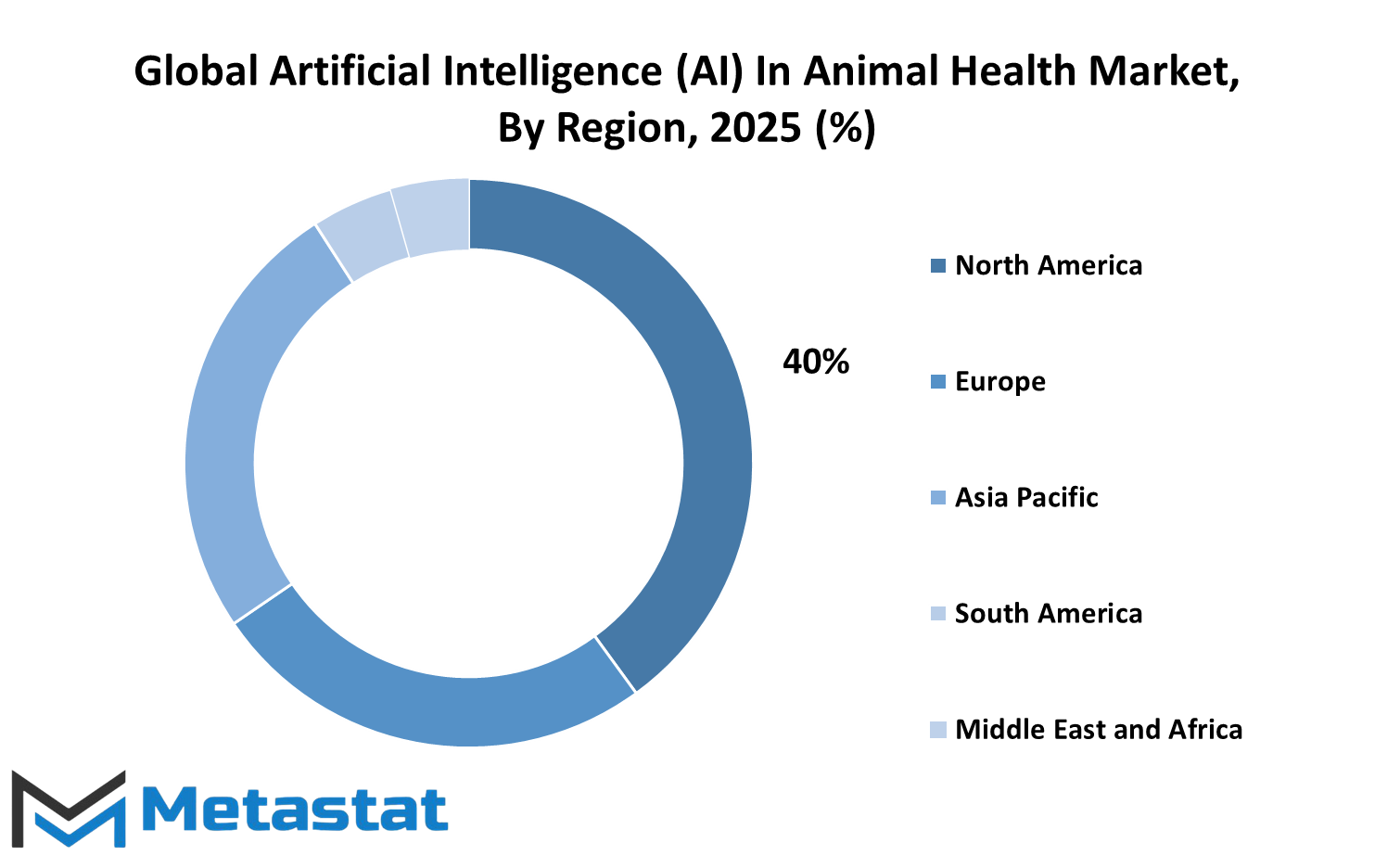
COMPETITIVE PLAYERS
The Global AI in Animal Health market is expected to grow substantially and undergo a transformation in the years to come. As technology progresses, AI is becoming a crucial part of the animal health industry, providing innovative solutions to enhance veterinary care, disease management, and animal welfare. AI is being adopted mainly due to the increasing need for efficient and accurate animal health monitoring systems. These systems allow the fast decision-making process for vets; therefore, the health outcomes of animals can be made better. With growing trends in pet care and livestock management worldwide, even further integration of AI in this sector seems to be a certainty.
The Global Artificial Intelligence in Animal Health market's future is greatly influenced by various players in the sector. Microsoft Corporation and IBM Corporation have brought their AI technology knowledge into the animal health market to provide cutting-edge systems for data analysis and diagnostics. Their work is being used to build intelligent tools for the early detection of disease, predictive analytics, and personalized treatment plans for animals. Other stakeholders such as Zoetis Inc. and Elanco Animal Health with significant pedigree in offering veterinary pharmaceuticals and diagnostics are also adopting various AI applications and developing AI-based solutions to support their product lines and improve animal care services. These companies invest heavily in R&D to come up with AI solutions that will meet the sector-specific needs of the animal health industry.
VCA Animal Hospitals Inc. and IDEXX Laboratories Inc., as healthcare providers, have an integral role in deploying AI innovations to clinical settings. They leverage AI diagnostic tools for accurate and rapid disease identification that translates to effective treatments. Merck Animal Health and Heska Corporation devote their competence toward advanced monitoring devices and AI platforms for real-time tracking of animal health. These innovations offer monitoring and prompt intervention that diminishes the chance of acute health problems.
Occupying a space that highly relies on research is the segment of those sectors introduced by such startups as PetPace Ltd., Vet Vision AI, and SignalPET. Wearable technologies, AI imaging systems, and smart diagnostics open new possibilities for non-invasive monitoring and precise health assessments. The innovations taken up by these companies are tirelessly pushing the limits AI can achieve with respect to animal healthcare.
Favorable for what lies ahead for the Global Artificial Intelligence (AI) in Animal Health market includes a growing synergy link among tech giants, pharmaceutical leaders, and specialized health service providers. This corroborative growing state is expected to influence the development of more advanced yet easy-to-operate AI solutions, changing the face of animal health care and assuring better health outcomes for pets and livestock across the globe.
Artificial Intelligence (AI) In Animal Health Market Key Segments:
By Solutions
- Software
- Hardware
- Services
By Animal Type
- Companion Animals (Dogs, Cats)
- Farm Animals (Cattle, Poultry, Swine)
- Aquaculture (Fish, Shrimp)
By Application
- Diagnostics
- Identification & Tracking
- Monitoring
- Drug Discovery & Development
- Others
By End-User
- Veterinary Clinics
- Animal Health Companies
- Farmers & Livestock Owners
- Research Institutions
Key Global Artificial Intelligence (AI) In Animal Health Industry Players
- Microsoft Corporation
- IBM Corporation
- Zoetis Inc.
- VCA Animal Hospitals Inc.
- IDEXX Laboratories Inc.
- Merck Animal Health
- Heska Corporation
- PetPace Ltd.
- Vet Vision AI
- SignalPET
- Elanco Animal Health
WHAT REPORT PROVIDES
- Full in-depth analysis of the parent Industry
- Important changes in market and its dynamics
- Segmentation details of the market
- Former, on-going, and projected market analysis in terms of volume and value
- Assessment of niche industry developments
- Market share analysis
- Key strategies of major players
- Emerging segments and regional growth potential



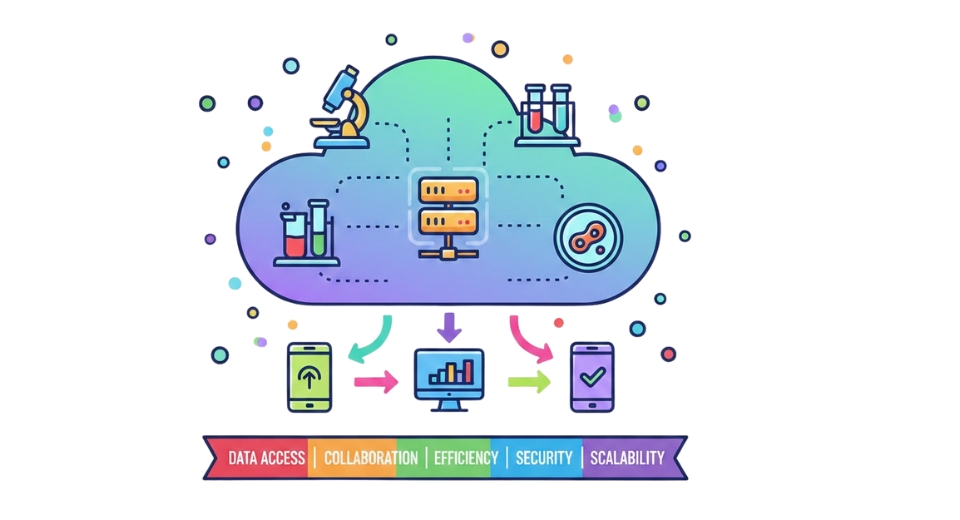
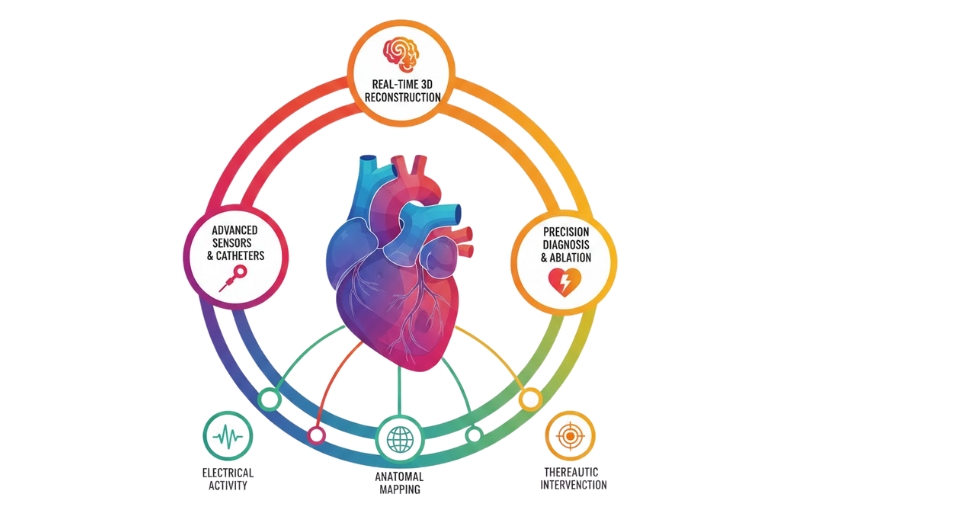
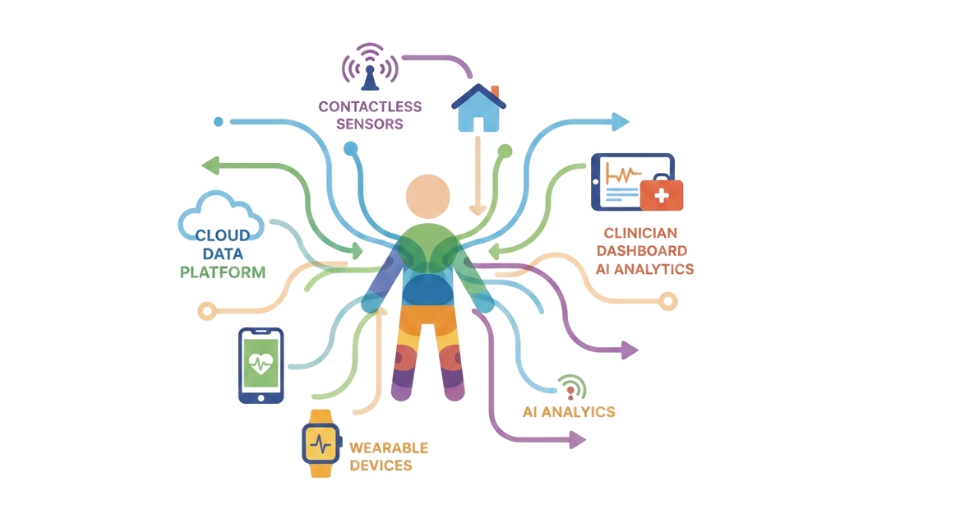
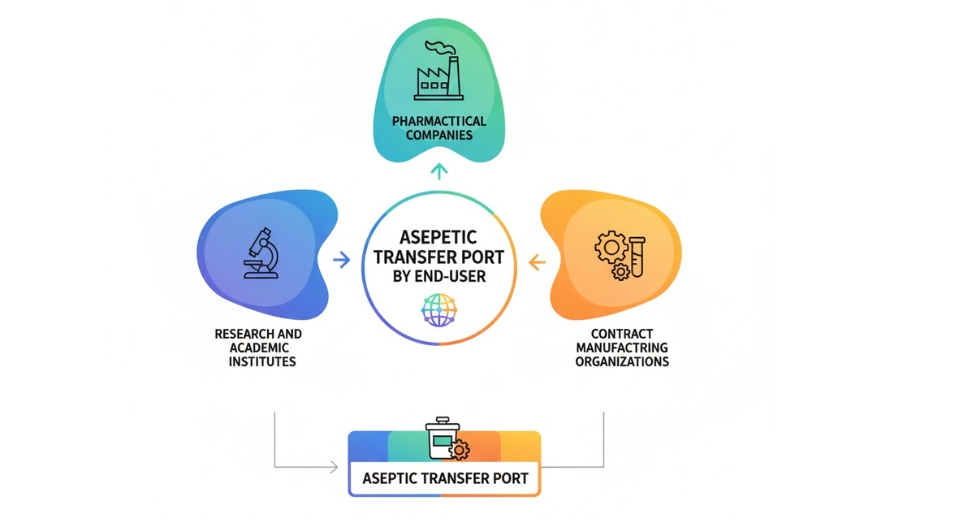

 US: +1 3023308252
US: +1 3023308252






